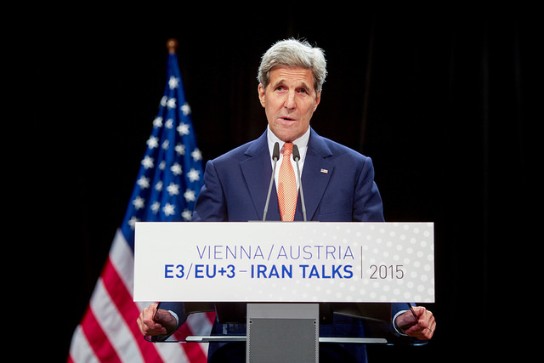
The Iran Deal: Good for U.S. National Security
The Iran Deal: Good for U.S. National Security
This morning, the P5+1, the EU, and Iran announced the successful conclusion of the negotiations over Iran’s nuclear program. The American Security Project supports this agreement. This deal blocks Iran’s pathway to a bomb, provides mechanisms for verifying its cooperation, and improves American national security. However, this deal doesn’t solve the non-nuclear issues with Iran and can’t be expected to.
Critics of this deal state that it provides Iran with a pathway to a bomb in the future. This is simply not true. The Joint Comprehensive Plan of Action limits uranium enrichment to a level far below that which is necessary for weaponization for at least 15 years. It significantly reduces the number of centrifuges Iran currently operates by two-thirds. It reduces Iran’s allowed stockpile of enriched Uranium by 98%. It does not preclude new agreements to be negotiated in the future to extend the limits imposed. Should Iran violate its requirements, there is a majority vote mechanism for re-imposing the sanctions regime which could not be blocked by even the combined opposition of Russia, China and Iran itself.
Under the agreement, Iran is to allow continuous monitoring of its nuclear activities for at least 15 years. That is 15 years of intrusive inspections and verification that Iran is not attempting to develop a nuclear weapon. Other elements of the inspections will last 25 years. The agreement consolidates Iran’s nuclear activities to designated sites, verifies they are peaceful, and increases the number of inspectors in the country. These inspections will ensure that Iran is in compliance with its obligations under the Nuclear Non-proliferation Treaty—the international standard that determines the acceptable operation of peaceful nuclear programs.
In exchange for this agreement, Iran will receive phased sanctions relief. Sanctions are both the stick that has brought Iran to the table, and the carrot that has encouraged the Iranian Government to reach an agreement. Without appropriate sanctions relief, Iran will not see a reason to adhere to the agreement, and it is crucial that Iran sees adherence to a deal as more beneficial than building a nuclear weapon.
It is also important to understand that this deal may not discourage Iran from continuing to support terrorism and destabilize countries around the Middle East—some say it may even increase its influence in the region. This may be true, but it was never intended to and couldn’t realistically address these issues. Simply put, putting an end to Iran’s nuclear ambitions is more important than Iran’s other activities. This does not imply that Iran’s other dangerous activities should be ignored, but rather that the danger of a nuclear Iran justified focusing exclusively on this issue in order to prevent the acquisition and potential use of a nuclear weapon.
The deal reached with Iran is not the end of this issue. Nor does it mean Iran is now a friend of the United States. It does not mean that Iran should be trusted, but rather, places a close eye on Iran’s nuclear activities. What it does mean is that the core objective of the nuclear negotiations has been reached: a mechanism has been developed that requires Iran to verifiably reduce its nuclear potential below a weaponizable level. It is too early to say whether this will provide precedent for addressing the many other issues the United States and international community have with Iran, but the possibility should not be precluded.
For U.S. national security, it is now fundamentally important that in return for Iran’s adherence to the core essence of this deal, the United States uphold its requirements under the agreement. As long as Iran verifiably complies with the international community’s expectations, the U.S. should fulfill its commitments as well, or risk damaging its future credibility as a negotiating partner. To lose that credibility would fundamentally cripple one of America’s most important national security tools. But ultimately, if Iran fails to adhere to the agreement, all options still remain on the table.





